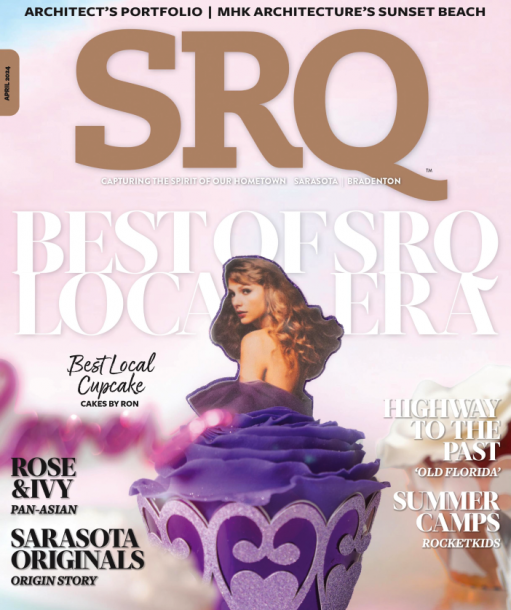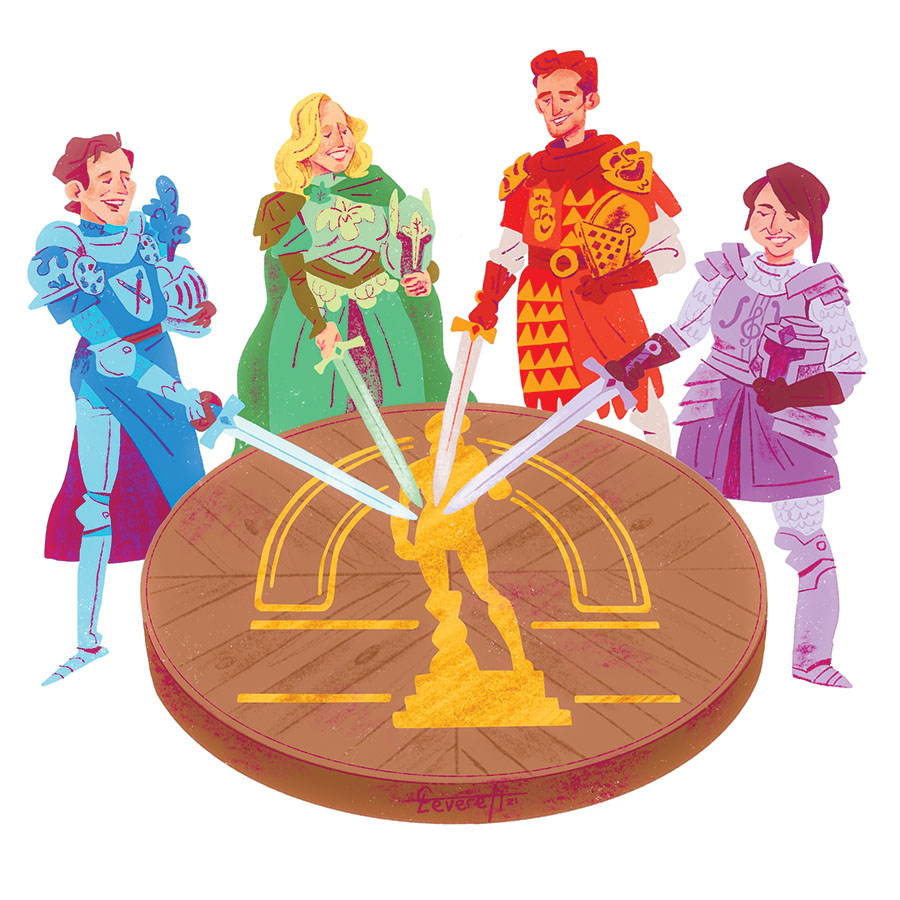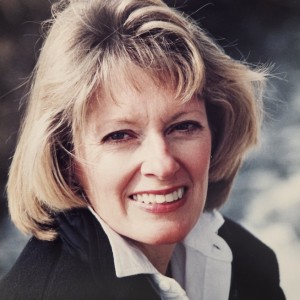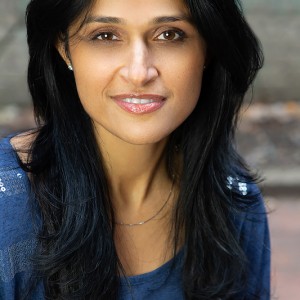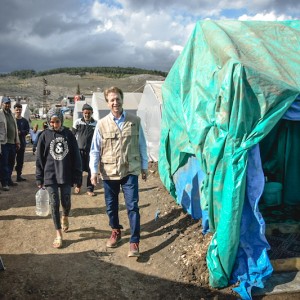As guests ambled toward their cars from Selby Gardens on the night of January 14, Brendan Ragan heard a recurring theme. It was opening night for the first installment of Urbanite Theatre’s Outdoor Reading Series, and where Ragan usually hears people compliment the show itself on their way out—the actors, the story, maybe the costumes or some other production element—a different through line manifested in the mask-muffled praise of the departing audience. “The most common response was, ‘Thank you for doing this,’” says Ragan, “which shows that people really needed something like this.”
The reading series represents the first slate of live shows Ragan and Urbanite’s co-artistic director Summer Wallace have produced in almost a year. And they needed it just as much as the guests at their show. “I had that opening night exhaustion and reverberating energy that takes a few hours to wind down from,” says Ragan, “and we’ve missed that.” But the path to that opening night was not traversed by Urbanite Theatre alone. In the year that shall be stricken from the history books, Ragan, Wallace and other arts executives donned their iron thinking caps and formed a covenant of collaboration, an all-for-one and one-for-all approach for live arts programming that yielded a sum far greater than its parts. In biweekly virtual meetings, artistic directors, organization executives and community stakeholders got together to share ideas, offer comfort, pool resources and, in the best of cases, brainstorm collaborations that helped to foster innovative programming during the “Performance Arts Plague.”
“When COVID-19 hit, I realized how difficult it was going to be for my colleagues in the performing arts world to operate,” says Selby Gardens president and Arts and Cultural Alliance board member Jennifer Rominiecki. One of the first things she offered to local theatres was the use of the gardens as a venue. “When we changed Selby’s operating model, it was to create experiences,” she says, “and part of that is creating interdisciplinary programming.” The gardens, which waived the standard usage fees as an added nudge to attract programming in the new year, had a beautiful open green space waiting to be used. “It helps us build an audience for the gardens at the same time it helps out the theatre,” says Rominiecki, “so it’s a win-win for everyone, including the community.”
Urbanite managed to sell all 120 socially distanced seats for that first Thursday night performance at Selby’s downtown campus, then 150 for the Saturday show. The production’s success was undoubtedly bolstered by the venue—where else can theatre connoisseurs catch a show beneath a canopy of centuries-old live oaks strung with lights? But the screenplay itself helped too. Titled Thirst and written by Ronán Noone, the story was a timeless and clever reimagining of Eugene O’Neill’s Long Day’s Journey into Night that explored the lives of the Irish immigrant servants living and working in the Tyrone household. More pertinent to the roundtable, Noone is an alum of The Hermitage Artist Retreat.
“We’d been wanting to do more programming outside of The Hermitage,” says Andy Sandberg, CEO of the artist retreat. Sandberg and Urbanite had already been in communication before the pandemic, but in the unique conditions in which the roundtable formed, their relationship became more than just an open door. “We had already tossed around the idea of Urbanite producing work from Hermitage playwrights,” says Sandberg. “Noone was on their calendar for a different play, but we also proposed Emily Kaczmarek.” Kaczmarek’s Sam & Lizzie ran in February’s installment of Urbanite’s reading series, with opening night taking place on The Hermitage’s private beach in Englewood.
Like Selby Gardens, Sandberg and The Hermitage saw an opportunity to mold the organization into a more visible community asset. “The Hermitage is kind of a hidden gem,” he says, “so one of the things we’ve focused on this year is trying to build more meaningful partnerships so we’re maybe not so hidden anymore.”
To that end, Sandberg had another collaboration stewing with Cheryl Mendelson of the Van Wezel Foundation. “We were looking to provide our audience an experience that was a little different,” says Mendelson, something other than the Netflix binges most Van Wezel patrons were relegated to while live performances were off-limits. The result of those conversations was Unscripted, a series of virtual experiences in which a small group of invitees got a peak behind the curtains at creative works in progress. Attendees were not told who the artist was until the day of the event and, because the numbers were kept small, the artist could meaningfully and directly respond to questions and comments. It possessed a level of spontaneity that lent the program a more visceral immediacy largely absent from more polished streamed performances. “It was really rewarding to be able to offer our donors and stakeholders a peak at the process rather than formal presenting,” says Mendelson.
“The biggest test for any organization is not when things are going well,” she says, “it’s when the rubber meets the road in times of distress and trauma.” Crises precipitate change or, in the case of the arts roundtable, collaboration. The Outdoor Reading Series and Unscripted both represent the kind of innovative programming made possible when organizations turn their gaze outward, rather than remain insulated. As the COVID-19 vaccine rolls out and the herd immunity prophesied for more than a year begins to take shape, the next question is: What happens to these collaborations?
After the success of the Outdoor Reading Series, Ragan certainly sees a place for similar programming in the future. “I don’t think this will ever replace our primary programming, but the feedback has been overwhelmingly positive,” he says, “so it’ll be interesting to see if we all cloister back into our organizations or if we can make this a more regular, albeit one-off type of event, we can do when the weather is nice.” The future of the Unscripted series appears destined for an annual reboot. “I envision Unscripted will ultimately have a home in the new performing arts center,” says Mendelson, who conceived a similar program as director of the Harris Theater in Chicago.
Like King Arthur’s knights, the Sarasota region is chock-full of organizations with champions who possess different strengths and virtues. From art incubators and production theaters to venues and community outreach, the pandemic set in motion a feedback loop whose sum turned out to be greater than its parts. Programs blossomed that, under different circumstances, may not have made it past the nascent conceptual stages. “For all of us, it was about taking a leap of faith to do more stuff outside of our organizations,” says Sandberg.
“The Sarasota community is so tightly woven and so rich with arts organizations,” says Rominiecki, “and the more we work together, the better off we all are.” SRQ




